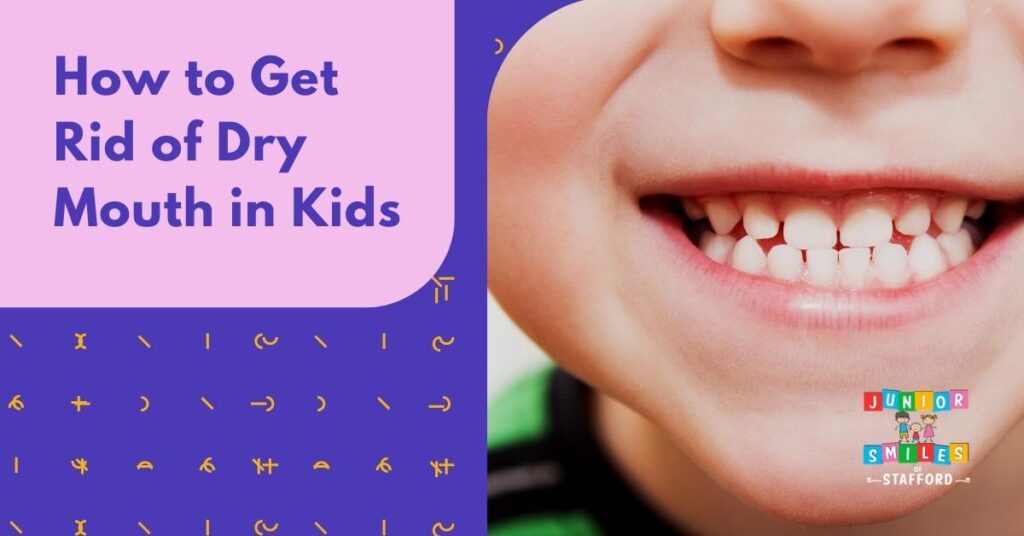How to Get Rid of Dry Mouth in Kids

Mouth dryness, also known as xerostomia, is a common side effect that can occur as a result of chemotherapy, radiation therapy, or certain medications. Some individuals may experience challenges when it comes to eating and conversing, as it can be quite uncomfortable. Moreover, it could potentially result in problems that put anyone’s, especially a child’s, nutrition, growth, and dental health at risk. Although there’s no need to panic about your child’s dry mouth, it’s advisable to avoid it if possible. Discover the signs, causes, and remedies for dry mouth in this all-inclusive blog post. Keep reading.
Prevalence of Dry Mouth in Children
Children who are more prone to have xerostomia are more likely to have health issues that reduce saliva production, use drugs that might cause xerostomia, and participate in activities at school and outside of school that can lead to dehydration (Taverna, 2023). Meanwhile, xerostomia was noted in 38.5% of children and 53% of adolescents with diabetes mellitus 1, as well as in 14-62% of instances with diabetes mellitus 2 (National Library of Medicine).
Symptoms of Dry Mouth in Kids
When you have dry mouth, your saliva production is poor or nonexistent. The result is an excessively dry mouth for your kid, which might lead to cracked lips, a parched tongue, and a parched throat. In order to identify dry mouth in your kid, keep an eye out for these signs:
Discomfort
One possible sign of a problem may be discomfort or pain. When the mouth becomes dry, sensitivity tends to heighten. Symptoms that may be experienced include dryness and cracking of the skin around the edges of the mouth, as well as irritation of the tongue and gums.
Increased Manifestation of Oral Health Issues
Saliva seals the mouth’s enamel against acid and germs while also hydrating the gums, tongue, and other soft tissues. A lack of saliva makes the mouth more susceptible to oral diseases. There is a strong correlation between one’s dental and general health, according to medical professionals. So, treating dry mouth is critical for overall health.
Difficulty in Consuming Fluids, Swallowing Food, and Communicating
Due to the dryness and discomfort, a child’s still-developing mouth may feel unsteady, making it difficult for them to articulate certain words or phrases. Further, the inability to properly swallow and chew food increases the risk of choking and aspiration since the mouth and throat have a harder and more painful time doing so when saliva is absent.
Frequent Thirst
Children may experience a sensation of dryness in their throat and mouth, resulting in a constant feeling of thirst. Additionally, they may experience a diminished sense of taste and a tingling sensation, potentially resulting in a sore throat.
Common Causes Of Dry Mouth
Children with xerostomia may experience difficulty in talking or eating. Observe whether their saliva looks foamy or stringy as they speak. If you experience any of these signs, there are a number of potential causes, including:
Medications
It is possible for xerostomia to be a side effect of some drugs. Dry mouth may be more common in children using certain medications for diseases including asthma, allergies, or attention deficit hyperactivity disorder (ADHD).
Side Effect of Some Diseases
Some medical diseases, such Sjögren’s syndrome, which affects the salivary glands, may cause dry mouth as a side effect. An additional list of diseases and disorders includes the following:
- hypertension
- mumps
- HIV/AIDS
- diabetes
- stroke
- PD
- anemia
- Alzheimer’s
- cystic fibrosis
Radiation Therapy
The use of radiation therapy, which is common among cancer patients, may cause systemic side effects such as dry mouth. Symptom management is the priority in the meantime; they will often go away once therapy is stopped.
Mouth Breathing
When a child has a stuffy nose, allergies, or both, they may find that breathing through their mouth is more comfortable. This may cause saliva production to decrease, which may lead to a dry and sticky mouth.
Typical Part of Growth
Babies and children’s bodies go through a period of normal development and growth. As their bodies, hormones, and neurological systems develop, it is normal for children to go through dry mouth episodes and occasional episodes of intense discomfort. As there are other causes of dry mouth, most people who experience this normally get over it in a few days.
Treatment Options for Dry Mouth in Kids
Kids with dry mouth may find relief with a variety of therapies, some of which are long-term and others of which are more immediate. Here are some examples of dry mouth treatment options you may try:
Keep Your Child Hydrated
An apparent solution to dry mouth is to drink more water. This is because providing children with an abundance of fluids is important since dry mouth is sometimes an indication of dehydration. Unless you’re doing very strenuous activity, the greatest approach to keep hydrated, according to studies from the National Library of Medicine, is to drink water anytime you feel thirsty.
Promote Good Oral Hygiene
An effective way to promote healthy gums and teeth is to practice good oral hygiene. Always remind them to brush, floss, and do mouthwash after every meal. Doing so can get rid of dangerous germs and dirt. There are mouthwashes and toothpastes made specifically for those who suffer from dry mouth, which may provide more ongoing assistance. Keep an eye out for pastes that don’t include Sodium lauryl sulfate or SLS.
Give Your Child Sugar-Free Candy
The best way to help your kid with dry mouth is to give them sugar-free or sugar-masked gum, as this will stimulate their body to make more saliva. For flavors that aren’t very harsh or unpleasant, cinnamon, mint, and citrus fruits are great options.
Offer Frozen Cucumber or Melon
Ask them to hold a piece of frozen cucumber or melon, which is high in water, between their gums and cheeks for an hour or two for a healthier and more pleasant alternative. Use one or more each day and store in the freezer if necessary.
See Your Child’s Dentist Regularly
Consultation with a pediatric dentist in Stafford, VA is among the best methods to identify appropriate treatments for dry mouth. Your child’s dentist may do more than just provide you treatment recommendations for dry mouth; they can also start to shed light on the underlying causes of your child’s condition. Make sure the dentist is informed right away if your child’s dry mouth problem has persisted.
Get Your Child Checked Today at Junior Smiles of Stafford
When children have dry mouth, it may lead to pain and even health problems. The key is to be aware of the signs and symptoms and the many medical and pharmaceutical factors that might contribute to their development. Hydration and proper dental cleanliness are some of the effective therapy choices that may greatly improve your child’s health. Even if you may try some home treatments, it’s always a good idea to see a professional for a personalized approach. The staff at Junior Smiles in Stafford, VA is here to help your kid with all of their oral health needs, including those associated with special needs like dry mouth. We are committed to delivering top-notch treatment in a pleasant, comfortable setting for children with the help of our team of skilled pediatric dentists. To help your kid keep their mouth in tip-top shape and their smile bright and healthy, we’ve put together this helpful guide to dry mouth.
Read next: Oral Thrush in Toddlers: Signs, Causes, and Treatment

